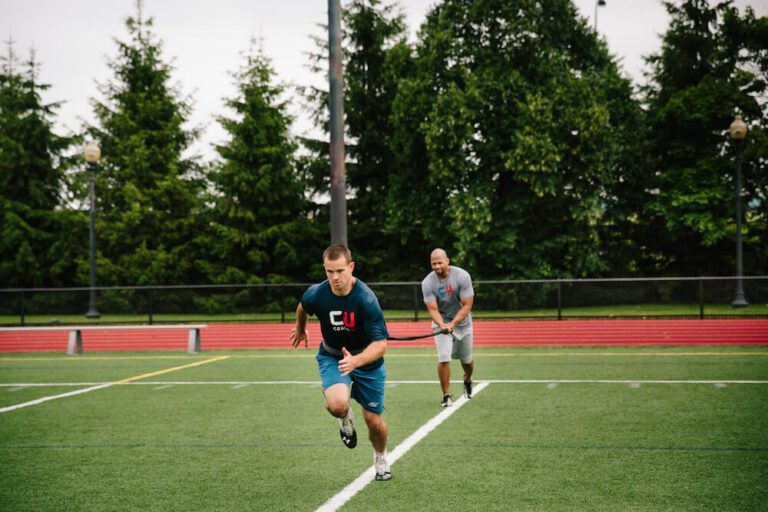Gettin’ Schooled with Michael: How do I choose a coach?
Over the past ten weeks, Grayson Williams-Krebs has been an outstanding addition to the CoachUp family as a hard-working intern that knows the passion required to play sports after high school. Although she’s headed back to the West Coast for her senior year at the University of Puget Sound and the final preseason of her career, we realized that Grayson should continue her work with us outside of the office. That’s why we’re launching a new series called Gettin’ Schooled with Grayson!
Check back every other week as Grayson will detail her journey through collegiate sports, answer the tough questions, and help athletes that need inspiration along the way!
Question #1: How do I know if I’m ready for the next level?
Question #2: The Must-Know Terms of Recruitment
Question #3: Should I contact a coach?
Question #4: How do I utilize my high school coaches?
This week, we’ve got CoachUp’s Michael Weisman filling in for Grayson this week to share his experiences playing baseball at Columbia University. In the office, he’s a member of CoachUp’s crazy-good Coach Engagement Team, but his journey at the Division 1 level makes his knowledge, advice, and support invaluable.
Enjoy!
How do I choose a coach?
Head coaches for collegiate athletic programs are in a unique position. Not only do they decide playing time and lead the team through each and every practice and game, they also decide who gets to be a part of the program at all. This is why the culture of a team and, ultimately, your collegiate athletic experience can be impacted so negatively or positively depending on your coach. A few years ago, I lived through the process myself, so, hopefully, some of the following can help increase the likelihood yours is even better.
When I entered the college recruitment process, I didn’t know what I was doing. I talked to different coaches on the phone every now and then and received a bunch of letters from schools I hadn’t even heard of, but I was lost. My final three options — Holy Cross, Columbia, and Harvard — were all in the Northeast so that I could remain close to home. I was lucky enough to have options to schools with relatively equivalent academics and areas of study. None of them, at the time, had a significant leg up on the others in terms of the quality of baseball they played. After hours on the phone, and an official visit to each, I finally made my decision.
While values will never be the same for each aspiring collegiate athlete, here are 3 qualities I saw in my future head coach, Brett Boretti, that led me to choose Columbia.
Positive Energy
We literally read a book called The Energy Bus by Jon Gordon as a team one year — it’s a must-read for all athletes as it describes the power of positive thinking. To me, Coach Boretti exuded positive energy, it was infectious. I suggest watching a practice as a recruit if possible — does your coach do the little things?
Coach Boretti would set the field up for drills instead of making the younger players do it. He was the first one there and the last to leave every day, always willing to stay late and throw extra batting practice to a struggling hitter.
Genuine interest in you, the athlete
My future coach would routinely ask me how my high school football season was going during the recruiting process. Why? Well, simply, he asked because he knew that it was important to me. He wanted to get to know me beyond just how fast I could throw on a mound.
Ask yourself, do you see yourself continuing your relationship with your coach beyond your playing days? Do you think your coach will still help you succeed when you can no longer help him or her win games on the field? Coach Boretti would work just as hard to make sure you were successful in an off-field endeavor as he did to maximize your baseball potential. When you choose a school, will your coach go that extra mile for you?
Ability to push you
This attribute applies whether you are going to compete in collegiate athletics or going to further your education. Arguably the biggest benefit that collegiate athletes can have is putting you into situations that make you uncomfortable. Being in situations where you may fail, and then learning how to overcome those failures, makes you grow as an athlete and as a person.
Having a coach that puts you into these types of situations will foster your development in the long run both on and off the field. Does your coach set expectations for you? If possible on your campus visit, ask players how they like the program. If everyone says it’s “easy” or “it’s always great” then that might actually be a red flag.
Remember, you want to be better than ever and that’s going to take some difficult situations, win or lose. This is certainly not a perfect formula, but surrounding yourself with a coach that exemplifies these qualities will help maximize your collegiate athletic experience. Not only will this help you have a positive relationship with your coach, but it’ll surround you with teammates that demonstrate similar attributes.
That way, you will be challenged and supported from all angles. These qualities spread throughout the Columbia baseball program and led us to three-straight Ivy League Championships and I have no doubt that Coach Boretti was the number one reason why.
Until next time,
Michael
How useful was this post?
Click on a star to rate it!
Average rating 1 / 5. Vote count: 1
No votes so far! Be the first to rate this post.



